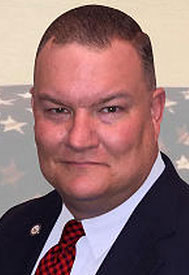
“That type of service needs to continue at midnight on the 31st of December. I think that’s really important for the citizens to understand, that there will be some continuity and consistency, because their expectations are there,” said Almarode, one of four candidates for the sheriff position.
“My experience means that there will be no learning curve. Obviously there will be things to learn in terms of administration. But in terms of the administration of the day-to-day operations, I think I bring that consistency and continuity as the most experienced of the four candidates,” said Almarode, who has 21 years of experience in the Augusta County Sheriff’s Office, most recently as a crime-prevention officer.
Almarode also brings experience in administration and budgeting, which he thinks is key considering the fiscal realities to managing operations in the sheriff’s office.
“In this environment, to go out here and set forth new initiatives that are directly budget-related can be problematic. We have to be able to do more with less financially,” said Almarode, promising to “think outside the box” to get things done.
A key to his plan is a proposal to move the county’s animal control unit under the purview of the sheriff’s office.
“I want to deputize them, retrain them, retool them, bring them under the auspices of the sheriff. They still have their day-to-day duties as animal-control officers, but in the event that we need them as support or as law-enforcement agents, they are there. That’s using current county resources to expand our department, using what we already have to establish some growth,” Almarode said.
Another outside-the-box proposal from Almarode involves the creation of a crime analyst position that would be responsible for “looking at the agency in and of itself, looking at how it operates and the efficiency in which it operates, and then reconstruct things so that we’re doing what we need to do in terms of patrols and enforcement.”
“That crime-analyst position will allow us to do that with data,” Almarode said. “When you have long-term data in front of you, you can almost predict certain things. It won’t be able to do so right at the outset. In its infancy, it’s going to take some time to build up the database that we’ll need to be able to use it to see patterns and make sense of what is happening. But over time, we will be able to see what we need to address.”
Without data as a guide, the sheriff’s office sort of wings it in terms of deploying resources.
“Right now, we patrol the same way we patrolled 20 years ago,” Almarode said. “The goal is that we’re actually in the areas that we’re needed. We’re present throughout the county, but we have enough information on what the problem areas are, where we need to put our attention, where the greatest need is. So we saturate those areas as much as we can, but we also have officers accessible in other parts of the county.”
The decision of the current sheriff, Randy Fisher, to voluntarily withdraw the office from the state accreditation process has been a big topic of discussion in the sheriff campaign. Almarode called the move by Fisher “a no-brainer” and said the forced 18-month waiting period before the sheriff’s office can reapply for accreditation will give the new sheriff time to make the changes that will need to be made to get things into compliance.
“That will make the actual re-accreditation much smoother,” Almarode said. “We can make those changes fairly immediately. I won’t say instantaneously, because we have 18 months to do it, and we can make those changes gradually within that 18-month period. But I think we will accomplish that with no problem.”
To Almarode, dealing with accreditation, big-picture items like budgets and deployment of resources, that’s the main thrust of the sheriff job.
“This job, regardless of what anybody says, is specifically administrative,” Almarode said. “Yes, there are times that I want to be in the public, and will be in the public. But to be in the public every day, for instance, in a patrol setting, it doesn’t work like that. You are an administrator of an enormous agency, and that’s an enormous responsibility.
“We have to liaison with our health services, with the financial community, with our other sister agencies, other government agencies, with the Commonwealth attorney’s office, so that investigations are spot-on. That’s what the sheriff’s office fosters,” Almarode said.
But the work doesn’t get done by robots. Almarode has proposed the creation of a deputy sheriff foundation that could over time provide a stable source of additional funding to go toward training, education and financial assistance to deputies who do the hard work on the front lines.
“The first thing that people cut in a budget when you’re counting pennies is support for your staff,” Almarode said. “You’re talking about the education, you’re talking about training, you’re talking about what happens when one of our deputies gets hurt in the line of duty, falls into financial trouble and runs out of options.
“We struggle every year to find money to keep these things alive. The foundation would generate funding to keep those alive even in a tough budget year,” Almarode said.
The 83 men and women who work in the sheriff’s office “mean more to me than anything but my personal family,” Almarode said.
“Because they are my family, and I know what they give up on a daily basis, and I know what their families give up on a daily basis,” Almarode said. “I will take that to the table. I will never forget them. I know that I will represent those faces, and the faces of those behind them, their families.”
– Story by Chris Graham










